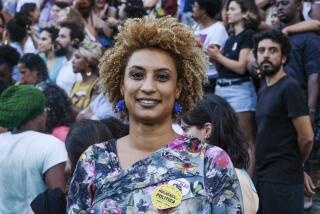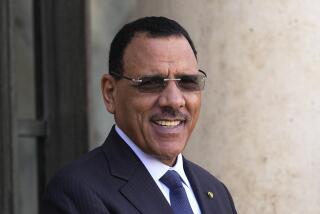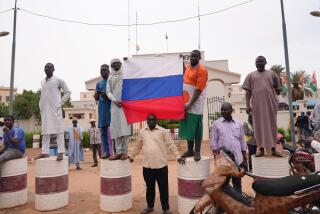Inquiry Decries Lax Security at Slaying of Algerian Chief : Assassination: Boudiaf’s killer is never seen in hourlong videotape. Nation reels amid political chaos.
ALGIERS — The 62 minutes of official government videotape that includes the murder of President Mohammed Boudiaf never show his killer.
They show the elderly, balding, almost bird-like head of state standing to deliver his address, and they show his narrow face suddenly grimacing in pain as bullets explode in his lungs and at the back of his brain. They show Boudiaf bleeding profusely on the floor. They show pandemonium and gunfire erupting all over the hall.
A commission of inquiry found that the presidential security detail inside the hall showed “no reaction” at all when the killer threw a grenade toward Boudiaf before firing. The same guards shot fruitlessly into the air after Boudiaf was hit, the commission reported. And the two chiefs of the regular presidential security force were outside the room at the time of the shooting, it found.
The commission noted that one other man was shot that day: an agent of the national police who was chasing the fleeing killer. He was cut down by a shot from the security forces.
As a nation already reeling from six months of political chaos struggled to understand the new violence last June 29, Algerian television broadcast a photograph of the assassin, 26-year-old sublieutenant Lembarek Boumaarafi.
Boumaarafi was the head of a special anti-terrorist force assigned for the first time ever to back up the regular presidential security detail for Boudiaf’s trip to the city of Annaba. His appointment to the detail occurred only at the last minute and was made over the objections of one of his commanders, who complained of his “indiscipline” and “bad character.”
The young officer, who surrendered soon after the assassination, told interviewers that he shot the president out of “religious convictions,” as vengeance for the “oppressed” Muslims of Algeria.
“I acted alone,” he told investigators. “No one helped me escape. Nobody asked me, or suggested to me, or ordered me to kill the president. . . . No member of the guard team was my accomplice.”
It is hard to find anyone in Algeria who believes this. For most Algerians, the assassination of Boudiaf, a 73-year-old hero of the 1962 revolution brought back from exile to help lead the country through its worst crisis since independence, has acquired the sense of mystery, bewilderment and disenchantment that many Americans feel to be the legacy of President John F. Kennedy’s slaying.
Algeria is a nation schooled in conspiracy by decades of French colonialism and then more decades of revolutionary socialist intrigue. So a crime that initially appeared to the world to be the work of Islamic fundamentalists disgruntled over the government’s annulment of an Islamic victory at the polls a year ago has taken on a much more complex character. Now hardly anyone thinks the banned Islamic Salvation Front ordered the killing.
If it did, many seem to believe, it was with the backing of a shadowy and much more lethal political power structure that feared Boudiaf’s dedication to throwing out Algeria’s political old guard and cleaning up decades of entrenched corruption.
For a nation torn between Islamic fundamentalism and Western-style secularism, which saw the elderly Boudiaf as its last best hope for national reconciliation, solving the murder has become as important as the war on terrorism and the fight to restore the democratic process, abruptly canceled a year ago when the fundamentalists won at the polls.
“If we don’t solve the question of the assassination of Boudiaf, Algerian society will continue in a state of crisis,” said Omar Belhouchet, publisher of the Algiers independent daily, Al Watan. “Lots of people think that he was certainly killed by a man who was a part of the security service, but (that) it was not completely an isolated act. It was an act which came at a moment when Boudiaf began to understand Algerian society . . . the political personalities, how they functioned, what were their motives, their connections, their connections with corruption, especially,” Belhouchet said.
“Who was Boumaarafi? Why was Boumaarafi sent at the last minute to Annaba, alone, without regular orders, and by whom was this done? These are the questions which must have a response. He was a pawn, but of whom? That is the question.”
The official commission of inquiry that was convened to end the speculation only deepened it when it said recently that Boudiaf’s killing certainly appeared to be a political assassination. It said someone was surely behind Boumaarafi, but that it didn’t know who.
The commission, after months of investigation, said it was clear that two major forces stood to benefit from the president’s death:
* The Islamic Salvation Front, which had called publicly for the death of Boudiaf and the four other members of the High Committee of State which took power in a bloodless coup d’etat after the cancellation of the elections.
* And, as the commission noted, “the clans of a system of power which has progressively installed itself at the head of the country like an iron collar. The feudal politico-financial lords who have amassed fortunes in reducing Algeria to a state of international beggary could not resign themselves to giving up power, much less answering for their administration.”
In the months before his death, Boudiaf had squared off with the Islamic fundamentalists, ordering thousands to sweltering detention camps in the Sahara, dissolving the Islamic Salvation Front and subjecting its entire leadership to rigorous military trials.
But he had also launched a vigorous campaign to open the “black dossiers” of corruption in Algeria. The system had allowed managers of the nation’s bankrupt public companies to amass large fortunes in Swiss banks, government ministers to take kickbacks on public contracts, smugglers working with customs officials to divert huge quantities of subsidized foods away from Algeria’s poor and sell them at a profit abroad, and a small cadre of businessmen to channel all of the country’s foreign currency reserves needed for importing goods to businessmen who were part of their clique.
Algerians call these people “the mafia.” They are part of the old guard of the National Liberation Front (FLN), which liberated the country from France and then ruled it for 30 years, and part of a network of businessmen and trabendistes , or smugglers, who have become hugely wealthy in one of the most debt-ridden countries in the world.
Boudiaf, an original leader of the FLN who left it after the revolution when it turned from a liberation movement into a political force, spent years of exile in Morocco before being asked to return last year. His recall came after President Chadli Bendjedid, whose flirtation with a legalized Islamic movement was seen by many as the cause of the country’s political crisis, was forced to resign.
Only months after he took over, Boudiaf oversaw the arrest of Gen. Mostefa Belloucif, a powerful former military adviser to Bendjedid and one of the key figures of the old socialist regime. Belloucif was accused of diverting large sums of money on military contracts.
“He threatened to bring a lot of people with him,” one European diplomat said of the general.
Next, Boudiaf trained his sights on Hadj Bettou, Algeria’s most infamous trabendiste , accused of possessing illegal weapons and amassing a fortune of millions of dollars smuggling goods across Algeria’s border with Mali and Niger. After Boudiaf’s death, he was sentenced to a mere eight months in jail on the weapons charge.
The landscape became more complicated when Justice Minister Mahi Bahi was fired. He was accused of dismissing five judges without the permission of the new head of government, Prime Minister Belaid Abdesslam, a key figure of the old FLN regime in the era of Houari Boumedienne.
Western diplomats say that two of the judges, subsequently replaced, were directly or indirectly responsible for inquiries into the Boudiaf assassination and a bombing earlier this year at Algiers airport, blamed on Islamic fundamentalists.
“The dossier on the Boudiaf assassination was transferred from Annaba to Algiers (under the direction of one of the judges in question), and people wondered why,” one European envoy said. “Was all of this connected to the Boudiaf inquiry? No one knows.”
The circumstances of the assassination itself remain even more perplexing. The two officers who ordered Boumaarafi to go to Annaba to head the anti-terrorism squad have been jailed but not charged. No one has said why they sent the assassin.
The commission of investigation found that the negligence and lack of coordination between the anti-terrorism squad and the presidential security detail “permitted and facilitated” the killing. Nevertheless, it said, there was no proof that these lapses were intentional.
Just as persistent are the questions about the assassin himself. Boumaarafi, questioned by a team of psychiatrists and the investigating commission, was found to be a man of above-average intelligence who seemed to have religious convictions: who prayed five times a day, who fasted for several days while in prison, who read tracts by Islamic writers like Muslim Brotherhood founder Hassan Banna.
But he also admitted to drinking alcohol and smoking dope.
“This man was not an Islamist,” said Brahim Taouti, a lawyer for the former Islamic Salvation Front. “Islamists don’t drink alcohol, Islamists don’t take drugs. . . . To me, it was an operation which was identical to the one (the bombing) carried out at the airport.”
Taouti and other front officials say they had nothing to do with either the Boudiaf killing or the bombing. The perpetrators of the bombing claimed ties to the front only under torture.
Moreover, front officials say they had indications that in the weeks before his death, Boudiaf was reconsidering his opposition to opening a dialogue with them.
“I don’t accuse anyone, but I say that every time the government is forced to discuss with the Islamists, there is an event which prevents it,” Taouti said. “Every time there was a possibility of peace, there was an act on the part of someone that forced the battle to continue.”
Boumaarafi told investigators that he had planned to assassinate Defense Minister Khaled Nezzar or Interior Minister Larbi Belkhair, whom he considered “symbols of the regime.” But those men did not turn up in Annaba, and he decided on Boudiaf at the last moment, he said. Yet in another statement after his arrest he talked of having “carried out the operation.”
Though he was assigned to Boudiaf only just before the incident, a letter found in his pocket, dated two days before the killing, asked a friend to look out for his family “in case an accident happens.”
Unable to resolve the questions, the commission of inquiry said that “in good conscience . . . without formal proof or sufficient charges” it could not cast suspicion on individuals--an indication that it indeed has strong suspicions that it lacks evidence to prove. The commission has left the investigation in the hands of judicial authorities.
For many Algerians, buffeted by the political storms that have hit the country since the Islamists won their first electoral victory in June, 1990, the assassination has caused feelings of despair. Boudiaf, an outsider, seemed to be the only one capable of bridging the country’s political chasm, of launching a unified course to begin resolving the grave economic and sociological problems.
Foreign Minister Lakhdar Ibrahimi wept when he talked of Boudiaf at a summit of Islamic leaders in Senegal last year. Interpreter Hafida Khelladi began crying as she translated his remarks.
“Boudiaf had a sense of legitimacy because he represented the 1962 revolution,” one diplomat explained. “It’s the only fixed point of reference that has any validity in this country. Everything after ’62 has been a compromise. The man was clean in a country that wasn’t, or in a country whose leadership wasn’t.”
Boudiaf’s family has expressed outrage, publicly avowing that they do not believe the killing was the work of Islamic fundamentalists and criticizing the commission of investigation for failing to point the finger at anyone.
Kim Murphy, The Times’ Cairo Bureau chief, was recently on assignment in Algeria.
More to Read
Sign up for Essential California
The most important California stories and recommendations in your inbox every morning.
You may occasionally receive promotional content from the Los Angeles Times.










